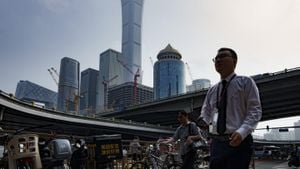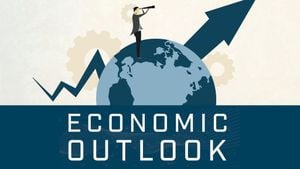The backdrop of rising prices and dwindling financial security echoes across households as inflation persists ominously. It feels as though, no matter where one turns—grocery stores, shopping malls, or even restaurants—everything is costing more, and options are dwindling. According to renowned economist Doug Casey, the erosion of living standards is not merely coincidental; it signals something deeply rooted in economic policies and societal dynamics.
Casey claims the conventional wisdom—that producers like butchers or gas station owners are to blame for inflation—is fundamentally misguided. Instead, he argues, the real culprits are government actions and the Federal Reserve's monetary policies. He emphasizes, “Higher prices... are 100% caused by increases in the money supply.” This shift away from valuing production toward blaming producers directly undermines the public's grasp of economic realities, leading to misallocated ire and misunderstanding.
It’s intriguing how most people perceive the government as their protector rather than as the source of their economic woes. Casey points out, “The public’s perception is the exact opposite of reality.” This misalignment compounds the problem, allowing governments to maintain their heroic image. “Producers are blamed as exploiters,” he continues, highlighting the common misconception. The reality, he asserts, is much grimmer; governmental policies, which do not contribute to tangible production, push prices higher.
This phenomenon of inflation manifests as a slow theft, where continually increasing money supply acts as the unacknowledged thief. People start feeling this theft quite intimately, as the purchasing power of their hard-earned money diminishes before their eyes. It's no wonder then, as Casey surmises, living under such circumstances breeds frustration and could even lead to moral decay within society. “Inflation is about theft—not production,” he argues. This moral dimension of economics indicates larger societal rifts occurring as inflation creates disparities between those who benefit from the government system and those merely trying to get by.
The nuances of inflation extend beyond mere dollars and cents as it catalyzes social discord. Casey connects the dots between devolving moral standards and economic pressures, stating, “Inflation leads people to cut corners, lie, cheat, or even steal.” The struggle for survival amid increasing costs can erode ethical paradigms, shifting societies toward increasingly desperate and unscrupulous behaviors.
Interestingly, Casey also pinpoints another fallout from systemic inflation: the rise of legal battles as alternative forms of conflict resolution. The legal system, intended to provide order and protection from theft, transforms under the strain, lacking the efficacy it once had. Casey refers to the establishment of laws as tools via which non-producers capitalize on the struggles of producers, foreshadowing the crumbling trust between ordinary citizens and their government.
Churning through historical precedents, Casey highlights past instances where inflation has bred civil unrest and societal collapse. The Weimar Republic is one such example. After World War I, hyperinflation rendered the Mark nearly worthless, resulting in chaos and civil strife. Such historical lessons serve to underline how significant economic deterioration shakes the very foundations of civil society.
He continues, pointing to the societal undercurrents at play, stating, “When real wealth becomes hard to produce, people are drawn to politics as the source of wealth.” Consequently, the instability of currency not only harbors economic repercussions but also gives way to unpredictable social dynamics and upheaval.
The notion of protecting oneself against inflation pivots discussions toward personal preparedness. Casey, ever the advocate for proactive measures, emphasizes acquiring diverse skills as fundamental for enduring inflation’s fallout. He cites the importance of preparing oneself intellectually and physically, thereby creating avenues for consistent production regardless of economic fluctuations.
For Casey, the road to resilience lies within knowledge acquisition and practical ability, straying from outdated educational paths. “A human being should be able to change a diaper, plan an invasion, butter a hog, conn a ship... Specialization is for insects,” he quips, reinforcing the role of adaptability and versatility across various life facets.
Despite advocating for individual preparedness, there’s also acknowledgment of the systemic issues at play. He prompts readers to rethink their savings and investment strategies, advocating for hard assets as buffers against inflation. “Save the excess in precious metals,” he advises, reinforcing the timeless appeal of gold as a hedge against inflations.
Additional discussions surrounding inflation extend to the role interest rates play within this complex economic web. The Federal Reserve faces unrelenting pressure to navigate rising inflation alongside managing interest rates. The delicate balancing act entails ensuring economic growth without fueling inflationary tendencies. This challenge is exacerbated by the prevailing public sentiment, which often calls for lower interest rates as relief from rising costs, yet risks creating even greater inflationary pressures.
Central banks regularly resort to adjustments as they look to fight inflation back. But what happens when cutting interest rates fails to rein in spiraling inflation? It’s no longer just numbers on paper but the bread and butter of everyday lives at stake. Casey’s insights serve as a cautionary reflection on the potential downturns facing citizens amid growing exasperation over stagnant wages and higher prices.
The interplay of inflation, social decay, and ethical erosion forms the crux of contemporary economic discourse. Though it feels like these issues ripple against the fabric of daily life, they demand examination. Culture and community strongholds become apparent through conversations about inflation’s ramifications, hinting at distress signals across the nation. Simultaneously, the clarion call to maintain household finances rings clear as families navigate what feels like choppy waters.
Indeed, the question remains: How can individuals secure their financial futures amid the chronic uncertainties brought forth by inflation? Finding viable solutions might not be simple, yet experts like Casey offer avenues for exploration, both at the personal level and through broader economic policies. It feels like the clock ticks louder as many brace for what lies on the horizon.
While Casey’s take on inflation tackles weighty themes, it’s the underlying nuance between survival, societal pressures, and ethical integrity during challenging times capturing attention. Each discussion serves to prompt listeners and readers alike to ponder their roles amid inflated price tags and shifting moral landscapes. It becomes increasingly evident how individual actions intertwine with broader economic realities, as society grapples with the challenges of inflation and interest rate debates, striving for solutions where sustainability meets stability.



